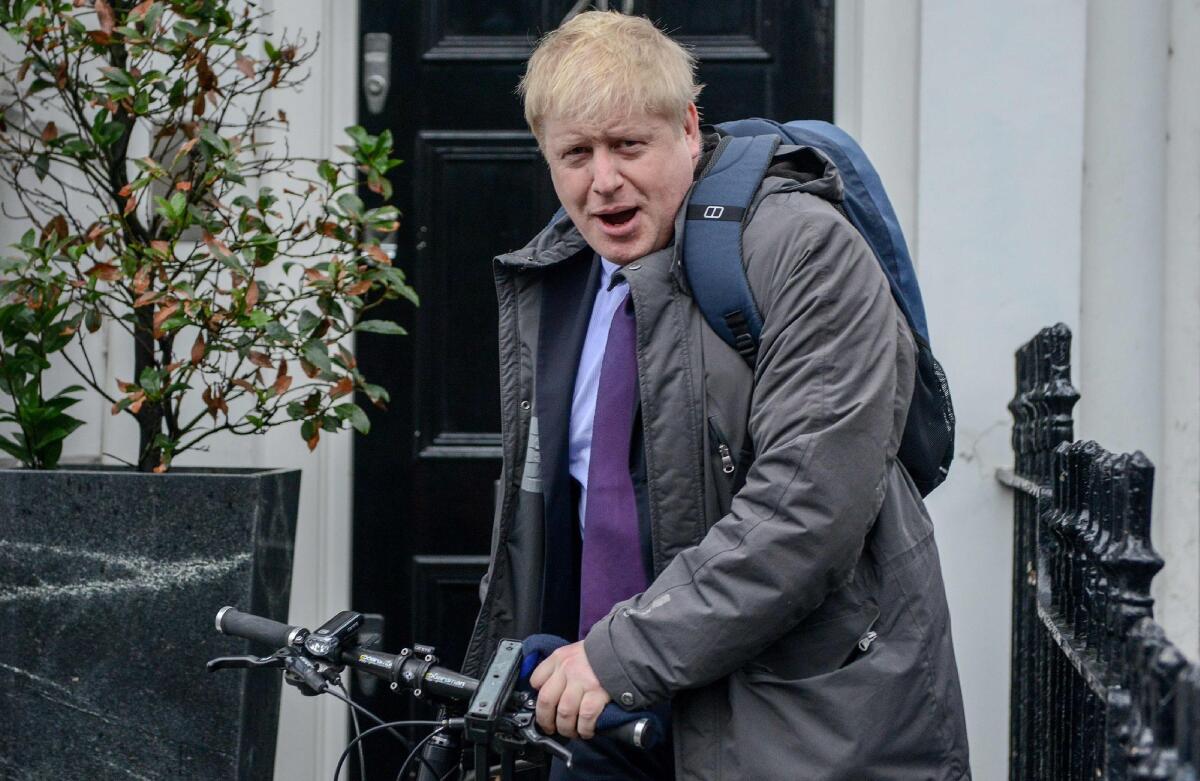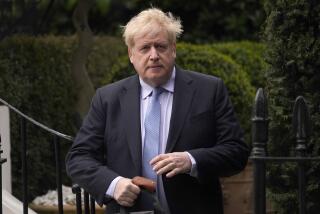You think American politics are brutal? The EU debate in Britain is turning just as nasty
Reporting from London — The debate over whether Britain should vote to leave the European Union took a turn Monday from the merely contentious to the intensely personal.
Prime Minister David Cameron delivered an impassioned plea to members of Parliament to reject a so-called Brexit and sign up for a deal with the EU that, he argued, would make Britain stronger, safer and more prosperous.
But what made the appearance remarkable — ”astonishing,” the Daily Telegraph wrote — was the bitter diatribe that Cameron aimed at London Mayor Boris Johnson, laying bare not only the personal rivalry between the two, but also the deep divisions that threaten to tear the Conservative Party apart and distract from the EU debate.
MORE: Get our best stories in your Facebook feed >>
Standing before the House of Commons, Cameron delivered a blistering attack on those who argue that voting to exit the EU in a nationwide referendum in June could enable Britain to negotiate a better deal with Brussels or pave the way for a second referendum on the issue.
He said a vote to leave the EU was definitively not an invitation to rejoin.
Although he did not mention anyone by name, Johnson — who announced Sunday that he would support leaving the EU — was unmistakably the object of his attack.

London Mayor Boris Johnson leaves his home by bicycle on Monday.
Speaking at times above loud heckles, Cameron culminated his speech with a particularly pointed jibe: “I have known a number of couples who have begun divorce proceedings. But I do not know any who have begun divorce proceedings in order to renew their marriage vows.”
Johnson’s first marriage ended in divorce after attempts to reconcile.
Before Johnson announced his decision, Cameron had been openly trying to win over his support. The mayor, who is also a Cabinet member, reportedly texted the prime minister of his decision nine minutes before going public.
The prime minister’s remarks to Parliament offered a glimpse of what could be four bruising months for the Conservative Party, which will find out whether it is big enough to accommodate both Cameron and Johnson.
NEWSLETTER: Get the day’s top headlines from Times Editor Davan Maharaj >>
Cameron was undoubtedly speaking to an audience larger than just Parliament when he urged support for the EU deal in the upcoming referendum.
“We are a great country and whatever choice we make, we will still be great,” he said. “But I believe the choice is between being an even greater Britain inside a reformed EU, or a great leap into the unknown.”
In a rare moment for the House of Commons, Cameron found himself being jeered by the Euroskeptic members of his Conservative Party but cheered by his opponents on the Labor, Liberal Democrat and Scottish National Party bench.
Labor leader Jeremy Corbyn described the EU referendum as “an historic choice” and stressed it is in the best interests of the country to stay.
“We believe that the European Union has brought investment, jobs and prospects,” he said.
Two major casualties of 2015’s general election campaign — former Liberal Democrat Leader Nick Clegg and former Labor Party leader Ed Miliband — also stood to voice their support for the stay campaign.
The Scottish National Party’s leader in Westminster, Angus Robertson, said Scotland was so vehemently in favor of staying in the EU that an exit vote could spark demands for a second Scottish independence referendum to “protect our place in Europe.”
But it was the scathing attack on Johnson that caused the most stir.
Until Sunday, the exit campaign lacked a big hitter who could grab headlines and galvanize public support. Johnson could now be that man.
Known for his disheveled clothes and wayward blond hair, he is the most well-recognized member of the Conservative Party after the prime minister.
He said the decision caused him “a great deal of heartache.” but many believe his decision was less ideologically driven than strategic because of his desire to hold the keys to 10 Downing St. one day.
“I’m not standing for reelection,” Cameron said, clearly alluding to Johnson’s ambitions. “I have no other agenda than what is best for our country.”
Johnson’s father found himself defending his son’s decision Monday.
“I think to say that this is a careerist sort of move is a total travesty,” Stanley Johnson said in a BBC radio interview. “I can’t think of any more career-ending moves than to do what he did yesterday.”
If the attack upset Johnson, he did not show it and later stood up to ask the prime minister to explain how this deal would return sovereignty to Britain, but the feelings of betrayal are unlikely to be forgotten by either side quickly.
Boyle is a special correspondent.
More to Read
Sign up for Essential California
The most important California stories and recommendations in your inbox every morning.
You may occasionally receive promotional content from the Los Angeles Times.










